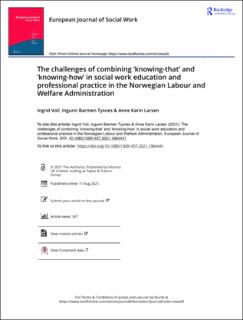The challenges of combining 'knowing-that' and 'knowing-how' in social work education and professional practice in the Norwegian Labour and Welfare Administration
Peer reviewed, Journal article
Published version

Åpne
Permanent lenke
https://hdl.handle.net/11250/2789016Utgivelsesdato
2021Metadata
Vis full innførselSamlinger
- Import fra CRIStin [3604]
- Institutt for velferd og deltaking [1018]
Originalversjon
Voll, I., Tysnes, I. B., & Larsen, A. K. (2021). The challenges of combining ‘knowing-that’ and ‘knowing-how’ in social work education and professional practice in the Norwegian Labour and Welfare Administration. European Journal of Social Work, 1-12. 10.1080/13691457.2021.1964441Sammendrag
This article presents data from a focus group study of social workers in the Norwegian Labour and Welfare Administration (NAV) and investigates how social workers perceive and experience the relevance of their education in the transition to their work in NAV. The relevance of education to practical fields became more important after the Bologna Process started in 2000. Research shows a discrepancy between what social workers learn during their professional education and the expectations they face when starting to work in welfare systems. Through analysing our data according to Ryle’s concepts of ‘knowing-that’ and ‘knowing-how’ and Lave and Wenger’s theory of situated learning and communities of practice, we discuss the participants’ experiences of the relevance of their education. Although the participants experienced their social work education as being relevant to their work in NAV, they expressed a need to learn more about how to apply theoretical knowledge during their education. The participants indicated work situations where they felt that their studies had insufficiently prepared them. In response to these findings, we discuss implications for social work education. Denne artikkelen presenterer data fra en fokusgruppestudie blant sosionomer i Arbeids- og velferdsetaten (NAV) med sikte på å utforske hvordan sosionomer oppfatter og opplever relevansen av utdanningen i overgangen til deres arbeid i NAV. Relevans av utdanning for praksisfeltet ble viktigere etter at Bolognaprosessen startet i 2000. Forskning viser en forskjell mellom hva sosionomer lærer i løpet av sin profesjonsutdanning og forventningene de møter når de begynner å arbeide i velferdssystemet. Ved å analysere våre data i henhold til Ryles begrep ‘ å vite at’ og ‘å vite hvordan’ og Lave og Wengers teori om situert læring og praksissamfunn, diskuterer vi deltakernes opplevelse av relevansen av deres utdanning. Selv om deltakerne opplevde sosionomutdanningen som relevant for sitt arbeid i NAV, uttrykte de et ønske om å ha lært mer om hvordan de skal bruke teoretisk kunnskap i løpet av utdanningen. Deltakerne pekte på arbeidssituasjoner der de opplevde at studiet hadde forberedt dem i for liten grad. I lys av disse funnene diskuterer vi implikasjoner for utdanning i sosialt arbeid.
